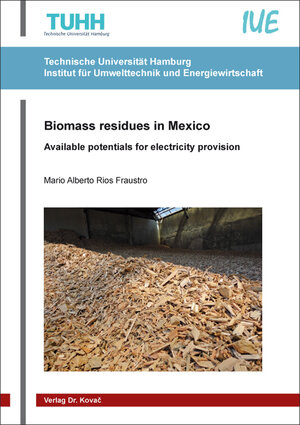
×
![Buchcover ISBN 9783339125422]()
Biomass residues in Mexico
Available potentials for electricity provision
von Mario Alberto Rios FraustroAmong the various renewable energy sources currently available, the use of biomass residues for energy generation has proven to be an excellent sustainable alternative, since it can solve two problems at once 1) Treating non-recyclable and non-reusable waste streams, 2) Providing non-intermittent energy in a sustainable way. Biomass residues can be defined as any left organic matter derived from plants or animals on a renewable basis. In this thesis a methodology for the reliable quantification of existing biomass residues potential for electricity generation in Mexico is developed. We also defined the main limitations, considering changes and evolution over time. We analyzed the economic feasibility of generating electricity from biomass residues in the country. We provided historical and projected scenarios and an adjusted spatial resolution to obtain a more dynamic picture of the potentials and a sensitivity analysis to understand how variables affect the overall results. Finally, we compared the potentials develop here with Mexico electricity´s demand. The results of this work indicate that between 4 to 20 % of the electricity generated in Mexico (2017) could be technically covered by biomass residues. And considering economic benefits in a period of 20 years, the economic potential in Mexico is calculated to cover between 2 to 15% of the electricity generated in the country (2017). Another important result of this work indicates that the selling price of electricity is the most sensitive value in the economic assessment, therefore reimbursement measures should be a government priority area to reach „green“ electricity goals. Finally, this work shows that municipal solid waste and wastewater have the most promising potential for electricity generation, as they have a high degree of ease of application.


